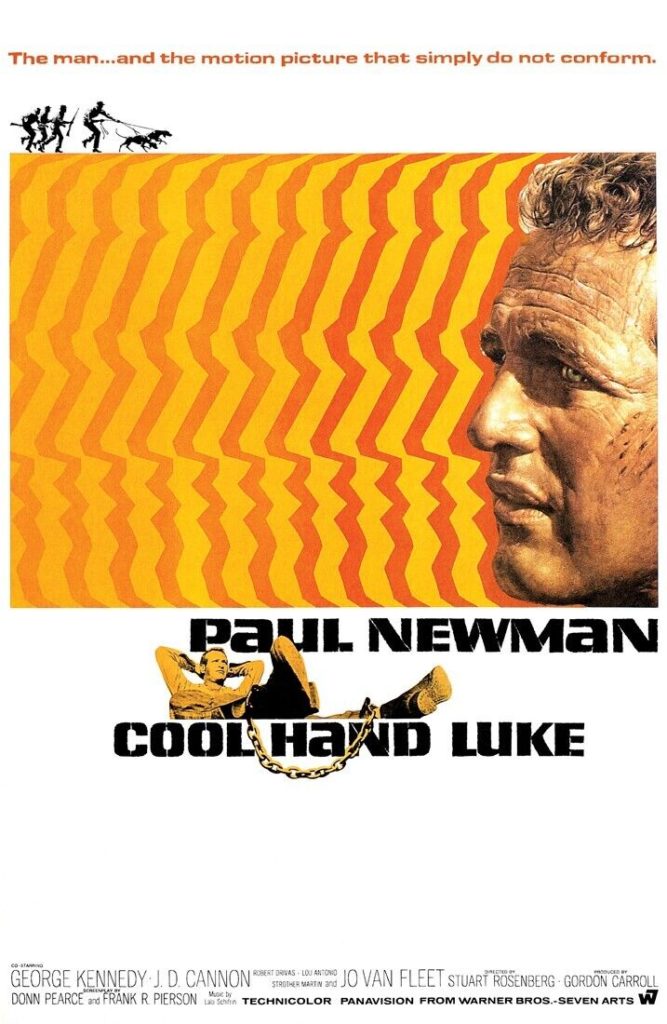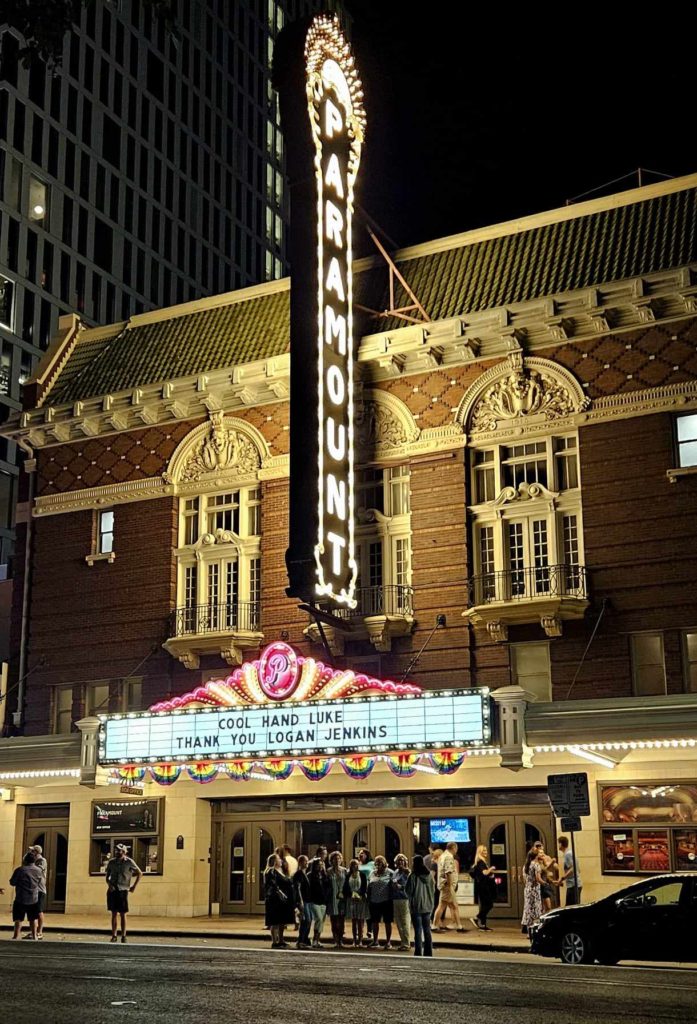Film Log #11 – 8.2023
Tuesday, August 15th, 2023Vulcan Video died during Covid and I haven’t been particularly motivated to stream new-to-me classics. Thankfully, The Paramount Summer Classic Film Series as well as Austin Film Society’s programming have motivated me to return to the theaters.


1967’s Cool Hand Luke
Adapted from the 1965 novel of the same name, and unless you read it (unlikely), the audience brings very little context into their screening. If you’re familiar with Paul Newman, you’re aware of the talent and aura he can bring to a picture. For most younger contemporary viewers, all one brings is whatever they know about 1960s media productions based on 1950s American culture.
The film opens with an inebriated Luke Jackson (Newman) in a small southern town; presumably after the bars have closed. Luke takes a No. 2 pipe cutter to 2” parking meter pipes and cuts the meters’ heads clean off. He rewards himself with a beer after each parking meter head clunks on the concrete. When the cops roll up and authority shows its face and potential force, Luke behaves as though they were nothing but ladybugs resting on his shoulders.
The first act introduces us to a very specific type of man. This man of certainty and stubbornness. Regardless of circumstance– be it war (WWII), late nights in small towns, or on a chain gang– this man only knows one way to act, with very little regard for authority.
Maybe that’s not heroic, but we see so many characters (or people in our actual lives) mimic, ape, and contort themselves to make it through their days. It’s refreshing to see people/characters who are thoroughly authentic even when it absolutely doesn’t suit them and, in many cases, when it’s to their detriment.
Dragline (Top Dog inmate prior to Luke’s arrival): “You don’t listen much, do ya boy?”
Luke: “I hadn’t heard much worth listenin’ to. A lot of guys laying down a lot of rules and regulations.”
Throughout the first act, Luke wins over the men in the chain gang while also winning over the viewing audience. As the viewers and chain gang grow to support Luke, the authority figures’ concern about Luke’s motivational power and leadership grows.
Many, many similarities to One Flew Over the Cuckoo’s Nest, The Shawshank Redemption, and other films about conformist institutions and the rebels determined to break them come to mind. With so many of today’s discussions revolving around anti-heroes, it should be noted that Roger Ebert wrote, “I think he’s [Luke’s] more a willing martyr– a man so obsessed with the wrongness of the world that he invites death to prove to himself correct.”
That’s damned admirable.
The second act masterfully solidifies the bonds we have with Luke. There’s a particularly touching scene as his mother visits the chain gang’s quarters/prison camp. We see personal sides of Luke as he suffers heart-sinking sadness, excruciating indignities, and elating triumphs. It’s a film that puts its hooks in you and makes you feel, really feel for a character (provided you allow yourself to give a shit in the first place).
Cool Hand Luke places us into an oppressive machine and points out the idiocy and injustice of it all. In the final scene of the film, Luke addresses God–
“It’s beginning to look like you got things fixed so I can’t never win out. Inside [chain gang, military, etc], outside [as a “free” man], all them rules and regulations and bosses. You made me like I am. Just where am I supposed to fit in? Ol’ Man, I gotta tell ya. I started out pretty strong and fast. But it’s beginnin’ to get to me. When does it end?”
When I describe 60s and 70s cinema as subversive, this is what I’m talking about. He’s questioning religion, an individual’s function within American society, and obviously authority. This was commercially-successful pop art whose main message is that society’s rules and its status quo are terribly backwards.
With awareness that it’s easier for audiences to connect with characters who share physical characteristics and have been through loosely similar sets of circumstances, I don’t come across too many contemporary characters delivering Luke’s lines– “You made me like I am. Just where am I supposed to fit in?”
Today’s cinematic conflicts feel bonkers-fantastical or incredibly specific to the point that there’s a significant disconnect (with me). Granted, provided my background (admittedly, a demographic that dominated well over seven decades of American media), I understandably haven’t felt like the target market of a culturally relevant art-film for some time. But after anyone has been wrought through the ringer just for being true to themselves, who wouldn’t ask Luke’s final question?
Chatter about Barbie
Before I write about The Age of Innocence (1993), Mr. Arkadin/Confidential Report (1955), F for Fake (1973), Kansas City Confidential (1952), Out of the Past (1947), Casablanca (1942), Lost in Translation (2003), Butch Cassidy and the Sundance Kid (1969), or any of the other films that I have watched/rewatched lately, I should take a minute to speak on a film that has so much buzz that it must be addressed: Barbie.
I haven’t seen it (and maybe I should just shut up– I know), but here are my thoughts before even viewing it. When I reviewed 2019’s Joker (in 2019), I wrote:
The thought I had going into the film was, “The Hollywood hype machine has made it seem that ever since movie studios have simply become creators of serial comic book blockbusters, that this particular film is what high art and Academy Award films are now destined to become.”
While watching the film, all I could do was pout, beg, and hope that this isn’t where art films (or films worthy of high praise) are headed.
To put it another way, we seem to be unable to tell stories without already knowing half the story before buying our tickets. This is a problem. Given that I’m hearing so much about a movie I’ll never even care about, this trend of not only having our shallow BIG TIME Summertime blockbusters built upon previously-established/borrowed/unoriginal content, but also our “high-brow, arthouse, Academy-considered” films are being pulled from similar content is troubling.
So, why is this an issue?
I’d argue that these films are lowering our ceiling of what powerful storytelling can/should be. I’m sure there are arguments that would counter by saying this maximizes our “powerful storytelling” capabilities because it serves a much, much larger audience and perhaps these films will serve as a gateway for many people to dive into Greta Gerwig’s (and other female auteurs’) films.
I get that using the “Barbie/Mattel Universe” as the vehicle to drive a message about the toxicity of the patriarchy we all live in is an easy way to bring this message to a large audience. I get that. However, it is possible to communicate this message without tethering it to a corporate doll.
Furthermore, I don’t see too many Barbie fans deciding that they’re now going to see Frances Ha (2012, starring Gerwig and written + directed by her then boyfriend Noah Baumbach), or dive into Agnes Varda’s filmography, or what I’d argue are films actually representing female empowerment such as Gravity (2013) or His Girl Friday (1940) [two of my favorites].
What is going to happen is that there are reportedly 45 Mattel film projects in development based on products such as Barney, Polly Pocket, Bob the Builder, Uno, Hot Wheels, Magic 8 Ball, American Girl Dolls, Bass Fishin’, Rock’em Sock’em Robots, He-Man and She-Ra, and I’d speculate that Barbie is more likely to create fans of the Mattel media universe instead of actual “women-powered art films,” but does any of this even matter?
If it’s your optimistic viewpoint that we’re going to receive thoughtful films illustrating a meaningful viewpoint that will help us collectively gain a unique and more learned perspective through these dozens of Mattel Films– then the future looks very bright. As for me, my realistic pessimism will remain that just as I didn’t care for this entire corporation’s product line as a child, and regardless of how much financing and talent they throw at these projects– I will care even less about these films that the Mattel brand is spawning.
Maybe some people believe 2019’s Joker does a commendable job of depicting how mental illnesses affect people and we should all be more aware and sensitive of this issue? And perhaps 2023’s Barbie perfectly presents how women have to exist and fight within this suffocating patriarchy?
Those aren’t my experiences. I have, however, felt as though I’ve been wrought through the ringer and shared many of Luke Jackson’s sentiments.
“Sometimes nuthin’ can be a real cool hand.”